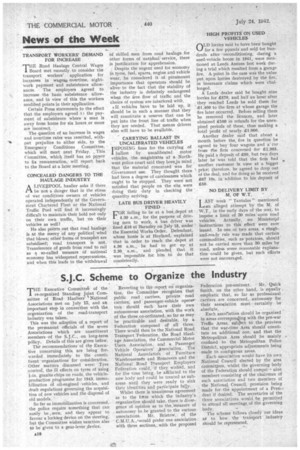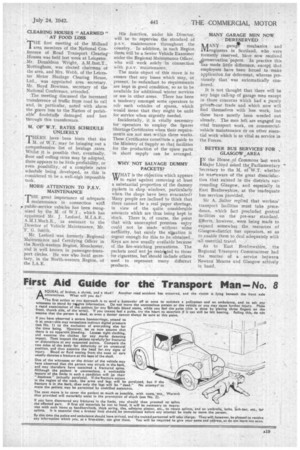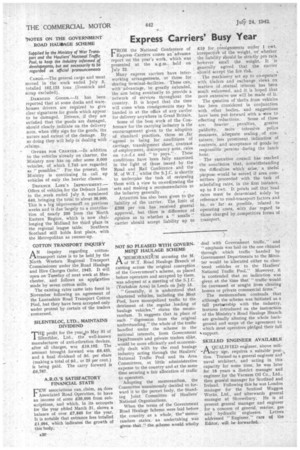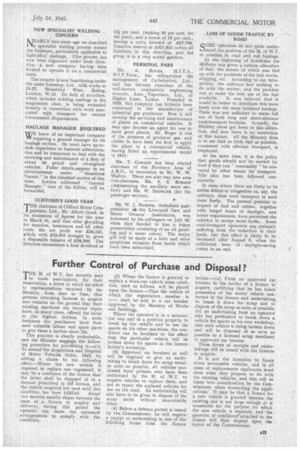News of the Week
Page 20

Page 21

Page 22

Page 23

If you've noticed an error in this article please click here to report it so we can fix it.
TRANSPORT WORKERS' DEMAND FOR INCREASE
T11E Road Haulage Central Wages Board met recently to consider the transport workers' application for increases in wages• overtime, nightwork payment and subsistence allowances. The employers agreed to increase the basic subsistence allowance, and in view of this the workers modified points in their application.
Certain Press statements to the effect that the employers agreed le) the payment of subsistence where a man is away from home for six hours or more are incorrect, The question of an increase in wages and overtime rates was remitted, withgut prejudice to either side, to the Emergency Conditions Committee, which will meet next Friday. _ This Committee, which itself has no power to fix remuneration,will report back to the Board at a later meeting.
CONCEALED DANGERS TO THE HAULAGE INDUSTRY
ALIVERPOOL haulier asks if there be no a danger that in the stress of war conditions owners of vehicles operated independently of the Government Chartered Fleet or the National • Traffic Pool will find it increasingly difficult to maintain their hold not only on their own traffic, but -on their vehicles as well?
• He also points out that road haulage is a the mercy, of any political wind that blows; other forms-of transpbrt are subsidised; road transport is not. Transference of goods from road to rail as a so-called measure Of national economy has widespread repercussions, and when this leads to the withdrawal of skilled men from road • haulage for other forms of natidnaP service, there is justification for apprehension.
Despite the urgent need for economy in tyres, fuel, spares, engine and vehicle wear, he considered it of paramount importance that operators should be aliveto the fact that the stability of the industry is definitely endangered when the -free flow of traffic and the choice of system are interfered with. .If vehicles have to be laid up, it should be in such a manner that they will constitute a reserve that can be put into the front line of traffic when they are needed. That means drivers also will have to be available.
CARRYING BALLAST IN UNCALIB RATED VEHICLES I MPOSING fines for the carrying of ballast by uncalibrated motor vehicles, the. magistrates at a Northwest police court said they borein mind that the material concerned was for GOvernment use. They thought there had been a degree of carelessness which ought to be stopped. They were not satisfied that people on the site were doing their duty in checking the quantity arriving.
LATE BUS DRIVER HEAVILY FINED
FOR failing to be at a bus depot at 4.30 a.m., for the purpose of driving men to work, a bus driver was fined 210 at Barnsley on July 15, under the Essential Works Order. Defendant, whose honie is at Hoyland, explained that in order to reach the depot at 4.30 a.m., he had to get up at 2.30 a.m., and pleaded that it -was impossible for him to do that consistently.
HIGH PROFITS ON USED VEHICLES
QLD lorries said to have been bought for a few pounds and sold for hundreds after reconditioning, during a used-vehicle boom in 1941, were mentioned at Leeds Assizes last week during a trial which resulted from a garage fire. A point in the case was the value put upon lorries destroyed by the fire, in insurance claims which were challenged.
A Leeds dealer said he bought nine lorries for £570, and half an hour after they reached Leeds he sold them for £1,400 to the firm at whose garage the fire later occurred. Before selling them he removed the licences, and later obtained £100 in refunds for the unexpired periods of these, thus making a total profit of nearly£1,000.
Another dealer said that about a month before the, fire in question he agreed to buy four wagons and a car from the firm concerned for £1,065. Hp paid a deposit of £50, hut two days later he was told that the firin had another customer in view at a bigger price; therefore, he agreed to drop out of the deal, and for doing so he received £67 14s. in addition to his deposit of 250.
NO DELIVERY LIMIT BY M. OF W.T.
LAST week " Tantalus " mentioned an alleged attempt by the M. of NV,T., in the early days ofthe war, to impcise a limit of 30 miles upon road vehicles. Actually, no Ministeri,a1 instructions to this effect were ever issued. In one or two areas, a rough. and-ready rule was made that certain commodities, such as 'potatoes, should' not be carried more than 30 miles by road,unless some reasonable explanation could be given, but such efforts were not encouraged.
CLEARING HOUSES " ALARMED " • AT FOOD LOSS
THE first meeting of the Midland area members of the National Conference of Road Transport Clearing Houses was held last week at Leicester.
_Mr. Donaldson Wright, A.M.Inst.T., Nottingham, was elected chairman of the area, and Mrs. Webb, of the Leicester Motor Haulage Clearing House, Ltd., was appointed area secretary. Mr. Boyd Bowman, secretary of the National Conference, attended.
The meeting discussed the increased transference of traffic from road to rail and, in particular, noted with alarm the grave loss to the Nation of perishable foodstuffs damaged and lost through this transference.
M. OF W.T. RATES SCI4EDULE UNLIKELY
THERE have been hints that the M. of W.T, may be bringing out a comprehensive list of haulage rates. Whilst it is possible that, eventually, floor and ceiling rates may tke adopted, there appears to be little probability, or even possibility, of a complete rates schedule being developed, as this is considered to be a well-nigh impossible task.
MORE ATTENTION TO P.S.V. MAINTENANCE
• THE great importance of adequate 1 maintenance in connection witll public-service vehicles has been recognized by the M. of W.T.; which has appointed Mr. J. Lesford, M.I.A.E., A.M.I.Mech.E., as assistant to the .Director of Vehicle Maintenance, Mr. F. G. Smith.
Mr. Lesford was formerly Regional Maintenance and Certifying Officer in • the North-Western Region, Manchester, and is well known in passenger-transport circles. He was also local secretary, in the North-western Region, of the I.A.E. His function, under his Director, will be to supervise the standard of p.s.v. maintenance throughout the country. In addition, in each Region there will be a Senior Vehicle Examiner under the Regional Maintenance Officer, who will work solely 'in connection with p.s.v. maintenance.
The main object of this move is to ensure that any buses which may, at _ present, be redundant to requirements are kept in good condition, so as to be available for additional whiter services or use in other areas. There has been a tendency amongst some operators to rob such vehicles of spares, which would mean that they might be unfit for service when urgently needed.
Incidentally, it is vitally necessary for operators to employ the Spares Shortage Certificates when their requirements are not met within three weeks. These Certificates-constitute a guide to the Ministry of Supply so that facilities for the production of the spare parts in short supply can be arranged.
WHY NOT SALVAGE DUMMY PACKETS?
WHAT is the objection which appears to er.ist against removing at least a substantial proportion of the dummy packets in shop windows, particularly when the shops have been evacuated? "Many people are inclined to think that there cannot be a real paper shortage, in view of the quite considerable amounts which are thus being kept in 'stock. There is, of course, the point that with unoccupied premises entry could not be made without some autriority, but surely the siluation is Urgent enough for this to he obtained. Keys are now usually available because of the fire-watching precautions. The packets need not e restritted to those for cigarettes, but should include others used to represent many different Products.
MANY GARAGE MEN NOW DERESERVED
IV4A N Y gara,11 mechanics and alengineers in Scotland, who were formerly reserved, have now received ereservation 'papers. In practice this -has made little difference, except that employers have been forced to make application for deferment, whereas previously that was automatically conferred.
It is not thought that there will be
any huge call-up of garage men except in those concerns which had a purely private-car trade and which now will find themselves with less work, but these have mostly been weeded out already. The men left are engaged on vital transport work, on commercialvehicle maintenance or on other essential work-which is as vital as service in the Forces.
BETTER BUS SERVICES FOR , GLASGOW ,,AREA
I N the House of Commons last week Major Lloyd asked the Parliamentary Secretary to the M. of.W.T. whether be was...aware of the great dissatisfaction that existed in the districts surrounding Glasgow, and especially in East Renfrewshire, at the inadequate bus services provided.
Sir A. Salter replied that workers' transport facilities mast take precedence, which fact precluded general facilities on the pre-war standard. Efforts, however, were being made to expand somewhat the resources of Glasgow-district bus operators, so as to enable them to deal adequately with all essential travel.
As to East Renfrewshire, the Regional Transport Commissioner had the matter of a service betWeea Newton Mearns and Glasgow actively in hand. .
°NOTES ON THE GOVERNMENT
• . ROAD HAURAGE SCHEME
Supplied by the Ministry of War Transport and the Hauliers' Notional Traffic Pool, to keep the industry 'informed of developnients, but not necessarily ro be regarded as official 'pronouncements CARGO.—The general cargo and meat moved in the week ended July 3, totalled 162,125 tons (livestock and scrap excluded).
DAMAGED • GOODS.—It has been reported that at some docks and warehouses drivers are required to 'give clear signatures for goods which appear to be damaged. Drivers,. if they are satisfied that the goods are damaged, should clearly, indicate on the delivery note, when they sign for the goods, the nature and extent of the damage. By so doing they will help in' dealing with /claims.
OFFERS FOR CHARTER. —Th addition to the vehicles already on charter, the Ministry now has on offer some 3,000 vehicles, of which 1,745 are regarded as ." possibles." For the present, the Ministry is continuing to call up vehicles of only the heavier classes.
DEFENCE. LINE'S IMPROVEMENT,—
Offers of vehicles for the Defence Lines in the, meek ended July 3; numbered 640, bringing the total to about 36,900. This is a big ithprovernefff on previous weeks and is due largely to a contribution of nearly 200 from the North Eastern Region, which is now challenging the Midland for third place in the regional league table. Southern Scotland still holds first place, with the Metropolitan as runner-up.
COTTON TRANSPORT INQUIRY
A' 'quiry regarding cottontransport rates is to be held by the North Western Regional Transport Commissioner under the Road Haulage and Hire Charges Order, 1942. It will open on Tuesday of next week at Manchester, and follows an applation made by seven cotton mills.
The existing rates came into force in Not ember following an agreement of the Lancashire Road Transport Cotton Pool, hut they have been accepted only under protest by certain of the traders concerned.
SILENTBLOC, LTD., MAINTAINS DIVIDEND
TH4 profit for the yearetto May 31 of
Silentbloc, Ltd., the well-known manufacturer of anti-vibration devices, after all charges, was 219,102. The amount brought forward was 26,435, and final dividend of 3d. per share (making a total of 6c1., or 25 per cent.) is being paid. The carry forward is 26,787.
A.R.O.'S SATISFACTORY FINANCIAL STATE
FEW associations can claim, a4 does Associated Road OperatOrs, to have an income of some 230,000 from subscriptions, and which, in its accounts for the year ended March 31, shows a balance of over, 27,849 for the year. It is notable that entrance fees totalled 21,094, which indicatesi the growth of this body.
NOT SO PLEASED WITH GOVERNMEV' HAULAGE SCHEME
A'MEMORANDUM accusing the M. of V.T. Road Haulage Branch of cutting across the original conception of the Government's scheme, as placed before operators and accepted by them. was adopted at a meeting of the S.J.C. (Yorkshire Area) in Leeds on July 15.
" Generally, it is understood that chartered vehicles, including the Meat Pool, have monopolized traffic to the detriment of the regular loading of haulage vehicles," states the memorandum. It suggests that in place of such ." digression from the original understanding," the whole of the traffic handled under the scheme in the national interegls, from Government Depaitments and private traders alike, would be more efficiently and economically dealt with by the road haulage industry acting through the Hauliers' National Traffic Pool and its Area Committees, at little administrative expense to the country and at the same time securing a fair allocation of traffic to operators. Adopting the memorandum, the Committee unanimously decided to forward it to the parent body, the Standing Joint Committee of Hauliers' National Organizations.
When the terms of the Government Road Haulage Scheme were laid before the country as a whole, the memorandum states, an undertaking was giventhat "the scheme would wholly
deal with Govern-Lent traffic," and " emphasis was laid on the one channel through • which . traffic handed by Government Depaitinents to the Minister would be 'allocated either to chartered vehicles or to the Hauliers' National Traffic Pool." Moreover, it is contended that no indioation was given at the time that" trafficwould be canvassed or sought from clearing houses or private commercial firms."
The memorandum contends that although the scheme was Initiated as a full partnership with the industry, features introduced on the instruction of the Ministry's Road Haulage Branch are gradually altering the whole background and scope of the agreement to which most operators pledged their full support.
SKILLED ENGINEER AVAILABLE
AQUALIFIED engineer, above mili-aty age, requires a suitable position. Trained as a general engineer and naval architect, and acting in this capacity for some time, he was later for -18 years a Zlistrict manager and engineer for the Vacuum Oil Co., Ltd., then general manager for Scotland and Ireland. Following this he was London manager for the Sentinel Waggon Works, Ltd., and afterwards general manager at Shrewsbury. He is at present general manager and engineer for a concern of general, marine, gas and. hydraulic engineers. Letters addressed " Engineer." care of the Editor, will be forwarded._
NEW SPECIALIST WELDING CONCERN
NEARLY two years ago we described specialist welding process named the Lenssens, particularly applicable to . light-alloy castings. Thisprocess has now been organized under fresh direction, a new company having been formed to operate it on a commercial basis.
The concern is now functioning under the name Lenssens, Ltd., with works at 25-27, BroadW;.y West, Ealing, London, W.13. Its field of activities, which includes welding castings in the ' magnesium class, .is being extended notably in connection with work associated with transport for certain Government Departments.
HAULAGE MANAGER REQUIRED
WE know of an important company requiring a general manager for its haulage section. He must have up-todart experience in business administration and be competent to deal with the servicing and maintenance of a flee,t of about 50 petrol and oil-engined vehicles. Fuller details Appear in an
advertisement under " Situation§ Vacant" in the classified section of this isSue. Letters addressed " General Manager," care of the Editor, will be 'forwarded.
CLIFFORD'S GOOD YEAR
THE chairman of Clifford Motor Com, ponents, Ltd., Mr. Albert Good, in his statement of figures for the year to March 31, said that after proyiding for taxation, insurances and all other costs, the net profit was ,£34,245, which, with £23,955 brought in, gives a disposable balance of £58,200. The directors recommend a final dividend of
12i. per cent. (making 20 per cent, for the year), and a bonus of 10 per cent., leaving a carry forward of £27,700. Taxation reserve at £321,832 col'rers all liabilities 'in this direction, and the group is in a very sound pnsition.
PERSONAL PARS MR, A. ROGER, M.I.T.A., M.I.P.TEcn., has relinquished the management of Carbohydrol, Ltd., and has become chairman of the well-known combustion engineering concern, Auto Vaporisers, Ltd., of Higher Lane, lymm. Founded in 1933, this company has hitherto been concerned in the ina,nufacture of industrial gas producers: Now it will develop the servicing and maintenance of plants on commercial vehicles. It may also become an agent for one or more good plants. Mr. Roger is one of the pioneers of producer gas, and claims to have been the first to apply the plant to a commercial vehicle, having fitted an experimental model in 1911: MR. T. GORDON has been elected chairman of the Northern Area of A.R.O., in succession to Mr. W. W. Walton. There are also twp new area vice-chairmen, Ma. S. S. ROBSON (representing the ancillary users section) and MR. W. SHOWLER (for the passenger section). .
Mn. W. J. HARPER, immediate pastpresident o& the Liverpool Cart and Motor Owners' Association, was honoured by his colleagues on July 16, when they handed to him a token presentation consisting of an oil painting and -a water colour. The major gift will be made at a later and more propitious occasion from funds which have been subscribed,
LOSS OF GOODS TRAFFIC BY ROAD
SOME operators do not quite understand the position of the M. of W.T. in relation to road and rail haulage.
At the beginning of hostilities the Mietistry was given a certain allocation of fuel, the' extent of which was tied up with the problems of the fuel stocks, shipping, etc. According to our information, the railways had nothing to do with the matter, and the problem was to make the best use of the fuel available. It was. believed that it would be better to distribute this more freely over the more localized haulage. There was not sufficient to make full use of both long and short-distance road-transport facilities. Actually, the Ministry never got down to this allocation, and now there is no restriction of this nature. All the Ministry does is to see that as little fuel as possible, consistent with efficient transport, is employed.
At the same time, it is the policy that goods should not' be carried by road if they can " reasonably " be conveyed by other means for transport. Thisidea has been followed consistently.
In cases where there are likely to be undue delays or congestion on, say, the railways, then road transport is used more freely. The present position in respect of fuel and rubber, together with longer hours of daylight, and better organization, have permitted the railways to accept more traffic. Some wad-transport operators arg certainly suffering from the reduction in their loads, but this effect is likely to be decreased after August 8, when the additional hour of daylight-saving comes to an end.




















































